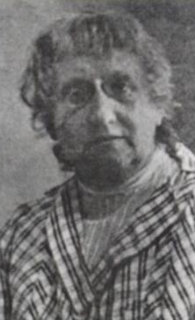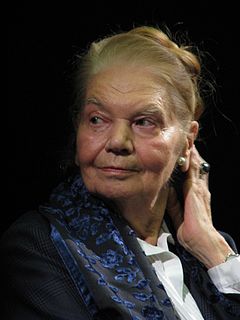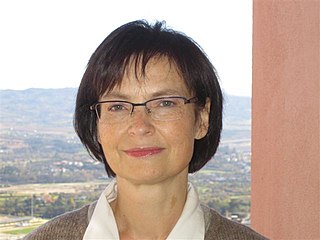 W
WFranciszka Arnsztajnowa was a Polish poet, playwright, and translator of Jewish descent. Much of her creative oeuvre falls within the Young Poland period, stylistically encompassing the twilight of neo-romanticism. She is called "the legend of Lublin".
 W
WKonstancja Benisławska (1747–1806) was a Polish poet and writer of religious hymns.
 W
WMarya Chéliga-Loevy was a Polish author, playwright, feminist and pacifist. She was born in Poland but spent much of her life in France.
 W
WWanda Maria Chotomska was a Polish children's writer, screenwriter and poet. She was born in Warsaw. She was notable for being the screenwriter of the Jacek i Agatka television series.
 W
WElżbieta Drużbacka was a Polish poet.
 W
WTeresa Ferenc, is a Polish poet.
 W
WZuzanna Ginczanka, pen name of Zuzanna Polina Gincburg was a Polish-Jewish poet of the interwar period. Although she published only a single collection of poetry in her lifetime, the book O centaurach created a sensation in Poland's literary circles. She was arrested and executed in Kraków shortly before the end of World War II.
 W
WWioletta Grzegorzewska, or Wioletta Greg is a Polish poet and writer, born in a small village Rzeniszów in Jurassic Highland in Poland. In 2006, she left her country and moved to the Isle of Wight. She lives in Essex.
 W
WJulia Hartwig-Międzyrzecka was a Polish writer, poet and translator, considered to be one of Poland's most important poets.
 W
WKazimiera Iłłakowiczówna was a Polish poet, prose writer, playwright and translator. She was one of the most acclaimed and celebrated poets during Poland's interwar period.
 W
WMaria Ilnicka, maiden name Majkowska was a Polish poet, novelist, translator and journalist. She took part in the January Uprising against Russia, as archivist of Polish National Government. After the collapse of the uprising, for short time, she was imprisoned. Ilnicka was advocate of feminism and organic work. In 1865, she was leading redactor weekly magazine for woman “Bluszcz”.
 W
WAnna Janko, is a Polish poet, writer, columnist and literary critic.
 W
WAnna Kamieńska was a Polish poet, writer, translator and literary critic who wrote many books for children and adolescents.
 W
WIrena Klepfisz is a Jewish lesbian author, academic and activist.
 W
WMaria Konopnicka was a Polish poet, novelist, children's writer, translator, journalist, critic, and activist for women's rights and for Polish independence. She used pseudonyms, including Jan Sawa. She was one of the most important poets of Poland's Positivist period.
 W
WRachel (Rokhl) Häring Korn was a Yiddish poet and author. In total, she published eight collections of poetry and two of prose.
 W
WUrszula Kozioł is a Polish poet. In 2011, she was a recipient of the Silesius Poetry Award.
 W
WKrystyna Krahelska "Danuta" was a Polish poet, ethnographer, member of the Home Army, and a participant in the Warsaw Uprising.
 W
WKatarzyna Krenz is a Polish writer, poet and painter.
 W
WAniela Kupiec was a Polish poet and public figure from Zaolzie region of Cieszyn Silesia in the Czech Republic. She wrote her poetry in the Cieszyn Silesian dialect.
 W
WKrystyna Lenkowska is a Polish poet and translator of Anglo-Saxon literature.
 W
WEwa Lipska, is a Polish poet from the generation of the Polish "New Wave." Collections of her verse have been translated into English, Italian, Czech, Danish, Dutch, German and Hungarian. She lives in Vienna and Kraków.
 W
WBeata Obertyńska,, born July 18, 1898, near Skole, died May 21, 1980 in London was a Polish writer and poet.
 W
WZofia Oleśnicka was a Polish Calvinist noblewoman, for many years considered to be the first Polish woman poet for a collection of Protestant hymns published in Cracow in 1556. However more recent scholarship has questioned the attribution of this collection to Zofia, and has ascribed the poems to Cyprian Bazylik, a poet and composer among the Calvinist nobility.
 W
WHanna Ożogowska was a Polish novelist and poet.
 W
WMaria Pawlikowska-Jasnorzewska, née Kossak, was a prolific Polish poet known as the Polish Sappho and "queen of lyrical poetry" during Poland's interwar period. She was also a dramatist.
 W
WHalina Poświatowska was a Polish poet and writer, one of the most important figures in modern/contemporary Polish literature.
 W
WWanda Sieradzka de Ruig was a well known Polish author, journalist, poet and translator.
 W
WAnna Stanisławska was a Polish author and poet known for her sole work Transakcja albo opisanie całego życia jednej sieroty przez żałosne treny od tejże samej pisane roku 1685, translated as Transaction, or a Description of the Entire Life of One Orphan Girl Through Doleful Laments Written by the Same 1685. The unpublished manuscript was discovered in a public library in St. Petersburg nearly two centuries later, in 1890, by Slavic studies professor Aleksander Brückner, who declared Stanisławska to be the earliest known Polish woman poet. The work was finally printed in 1935.
 W
WMaria Wisława Anna Szymborska was a Polish poet, essayist, translator and recipient of the 1996 Nobel Prize in Literature. Born in Prowent, which has since become part of Kórnik, she later resided in Kraków until the end of her life. In Poland, Szymborska's books have reached sales rivaling prominent prose authors', though she wrote in a poem, "Some Like Poetry", that "perhaps" two in a thousand people like poetry.
 W
WJoanna Wajs is a Polish writer, literary critic and literary translator. She studied Polish and Italian philology at the University of Warsaw. Her prose works and poetry have been published in numerous respected literary periodicals in Poland. Her poetry has been translated into several languages, including Italian, Slovenian and Hebrew. Her first collection of poems, entitled Sprzedawcy kieszonkowych lusterek, was published in 2004 by the publishing house Zielona Sowa in Krakow. This collection won a number of prestigious awards, including the Kazimiera Iłłakowiczówna Prize, which is awarded annually to debut poetry collections by Polish authors. She translates from Italian into Polish, including works by Oriana Fallaci, Dino Buzzati, Gian Antonio Stella and Valerio Evangelisti. She is also the editor of a column on poetry for the daily newspaper Gazeta Wyborcza.
 W
WGrażyna Wojcieszko is a Polish poet, author of collections: W oczekiwaniu, Karuzela, Les abattoirs de Bruxelles and Sen o Tramwaju. The collection Les abattoirs de Bruxelles qualified for the Silesius 2008, a Polish Poetry Award; the collection was translated into French by Alain van Crugten, and published in 2011; poems were also translated into Swedish by Jurek Hirschberg and published in SueciaPolonia.
 W
WKazimiera Zawistowska de domo Jasieńska, pseudonym Ira, (1870–1902) was a Polish poet and translator.
 W
WBarbara Zbrożyna (1923–1995) was a Polish sculptor, author of figural sculptures, monuments, portraits, religious and sepulchral sculptures. Her style evolved from realism through the synthetic simplifications, expressive and metaphoric deformation, to abstraction. She was also a painter, drawer and poet. Awarded for achievements in arts by Solidarność, awarded the Prize of Brat Albert Chmielowski (1986) and Prize of Polcul Foundation (1991).
 W
WNarcyza Żmichowska pronounced [narˈt͡sɨza ʐmʲiˈxɔfska], also known under her popular nom de plume Gabryella, was a Polish novelist and poet. She is considered a precursor of feminism in Poland.
 W
WIzabela Zubko is a Polish poet.